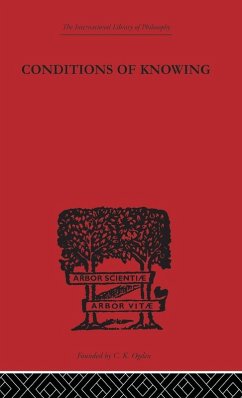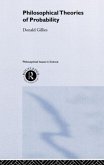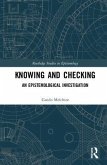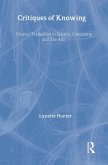- Gebundenes Buch
- Merkliste
- Auf die Merkliste
- Bewerten Bewerten
- Teilen
- Produkt teilen
- Produkterinnerung
- Produkterinnerung
This is Volume VIII of five of the Epistemology and Metaphysics series. First published in 1951, this book is an essay towards a theory of knowledge, and an attempt to detect and identify some changes of general outlook in the epistemological field which seem to be taking place in our society.
Andere Kunden interessierten sich auch für
![Philosophical Theories of Probability Philosophical Theories of Probability]() Donald GilliesPhilosophical Theories of Probability176,99 €
Donald GilliesPhilosophical Theories of Probability176,99 €![Being and Knowing Being and Knowing]() Frederick D. WilhelmsenBeing and Knowing197,99 €
Frederick D. WilhelmsenBeing and Knowing197,99 €![Knowing and Checking Knowing and Checking]() Guido MelchiorKnowing and Checking168,99 €
Guido MelchiorKnowing and Checking168,99 €![Critiques of Knowing Critiques of Knowing]() Lynette HunterCritiques of Knowing170,99 €
Lynette HunterCritiques of Knowing170,99 €![Worlds of Knowing Worlds of Knowing]() Jane DuranWorlds of Knowing168,99 €
Jane DuranWorlds of Knowing168,99 €![Knowing the Difference Knowing the Difference]() Kathleen Lennon / Margaret Whitford (eds.)Knowing the Difference218,99 €
Kathleen Lennon / Margaret Whitford (eds.)Knowing the Difference218,99 €![Artificial Knowing Artificial Knowing]() Alison AdamArtificial Knowing150,99 €
Alison AdamArtificial Knowing150,99 €-
-
-
This is Volume VIII of five of the Epistemology and Metaphysics series. First published in 1951, this book is an essay towards a theory of knowledge, and an attempt to detect and identify some changes of general outlook in the epistemological field which seem to be taking place in our society.
Produktdetails
- Produktdetails
- Verlag: Routledge
- Seitenzahl: 262
- Erscheinungstermin: 1. September 2000
- Englisch
- Abmessung: 222mm x 145mm x 18mm
- Gewicht: 465g
- ISBN-13: 9780415225274
- ISBN-10: 0415225272
- Artikelnr.: 21450540
- Herstellerkennzeichnung
- Libri GmbH
- Europaallee 1
- 36244 Bad Hersfeld
- gpsr@libri.de
- Verlag: Routledge
- Seitenzahl: 262
- Erscheinungstermin: 1. September 2000
- Englisch
- Abmessung: 222mm x 145mm x 18mm
- Gewicht: 465g
- ISBN-13: 9780415225274
- ISBN-10: 0415225272
- Artikelnr.: 21450540
- Herstellerkennzeichnung
- Libri GmbH
- Europaallee 1
- 36244 Bad Hersfeld
- gpsr@libri.de
Angus Sincalre
Introduction; Part 1 Prolegomena; Chapter 1 The Present Position; Chapter 2
Sequence of the Discussion; Part 2 ::; Chapter 3 Progress; Chapter 4 Order
and System; Chapter 5 1Cf; i.e. this is a discussion of what is involved in
any teleological explanation, and the distinctions ordinarily drawn between
'teleology' and 'design' or between teleology in the Aristotelian sense and
in that of Archdeacon Paley are not relevant, as we are discussing the more
general theory of which these are different special cases; Chapter 6
Scientific Hypotheses and Laws of Nature; Chapter 7 Causality; Chapter 8
1Cf. page 64, note; Chapter 9 1We are not concerned here with any Part
Icular theories about the nature of past, present and future, or about our
experience of these and of events and conditions as being in them, but with
the epistemological conditions of all such theories. I.e. this chapter is a
discussion of the more general theory or attitude which sets the limits
within which all such theories about time must fall. (Cf. page 33.)For this
reason, certain distinctions which would ordinarily be made between
different meanings of 'time' need not be introduced here, for instance the
distinction between 'time' envisaged as a bird gliding over a series of
hedgerows and 'time' envisaged as the hedgerows. Thus this chapter is not
an erratic alternation between the discussion of time in one sense and time
in various other senses, but is a discussion of the more general theory in
terms of which alone it is possible to distinguish these various senses;
Chapter 10 Space; Chapter 11 Qualities; Part 3 Essay to Wards a Theory of
Knowledge; Chapter 12 Facts; Chapter 13 Knower and Known; Chapter 14
Language and Statement; Chapter 15 Attitudes; Chapter 16 Appearance and
Reality; Chapter 17 Sensations, Perceptions, Feelings, Emotions and Things;
Chapter 18 Meaning; Chapter 19 Truth; Chapter 20 Inference and Explanation;
Chapter 21 The Criterion;
Sequence of the Discussion; Part 2 ::; Chapter 3 Progress; Chapter 4 Order
and System; Chapter 5 1Cf; i.e. this is a discussion of what is involved in
any teleological explanation, and the distinctions ordinarily drawn between
'teleology' and 'design' or between teleology in the Aristotelian sense and
in that of Archdeacon Paley are not relevant, as we are discussing the more
general theory of which these are different special cases; Chapter 6
Scientific Hypotheses and Laws of Nature; Chapter 7 Causality; Chapter 8
1Cf. page 64, note; Chapter 9 1We are not concerned here with any Part
Icular theories about the nature of past, present and future, or about our
experience of these and of events and conditions as being in them, but with
the epistemological conditions of all such theories. I.e. this chapter is a
discussion of the more general theory or attitude which sets the limits
within which all such theories about time must fall. (Cf. page 33.)For this
reason, certain distinctions which would ordinarily be made between
different meanings of 'time' need not be introduced here, for instance the
distinction between 'time' envisaged as a bird gliding over a series of
hedgerows and 'time' envisaged as the hedgerows. Thus this chapter is not
an erratic alternation between the discussion of time in one sense and time
in various other senses, but is a discussion of the more general theory in
terms of which alone it is possible to distinguish these various senses;
Chapter 10 Space; Chapter 11 Qualities; Part 3 Essay to Wards a Theory of
Knowledge; Chapter 12 Facts; Chapter 13 Knower and Known; Chapter 14
Language and Statement; Chapter 15 Attitudes; Chapter 16 Appearance and
Reality; Chapter 17 Sensations, Perceptions, Feelings, Emotions and Things;
Chapter 18 Meaning; Chapter 19 Truth; Chapter 20 Inference and Explanation;
Chapter 21 The Criterion;
Introduction; Part 1 Prolegomena; Chapter 1 The Present Position; Chapter 2
Sequence of the Discussion; Part 2 ::; Chapter 3 Progress; Chapter 4 Order
and System; Chapter 5 1Cf; i.e. this is a discussion of what is involved in
any teleological explanation, and the distinctions ordinarily drawn between
'teleology' and 'design' or between teleology in the Aristotelian sense and
in that of Archdeacon Paley are not relevant, as we are discussing the more
general theory of which these are different special cases; Chapter 6
Scientific Hypotheses and Laws of Nature; Chapter 7 Causality; Chapter 8
1Cf. page 64, note; Chapter 9 1We are not concerned here with any Part
Icular theories about the nature of past, present and future, or about our
experience of these and of events and conditions as being in them, but with
the epistemological conditions of all such theories. I.e. this chapter is a
discussion of the more general theory or attitude which sets the limits
within which all such theories about time must fall. (Cf. page 33.)For this
reason, certain distinctions which would ordinarily be made between
different meanings of 'time' need not be introduced here, for instance the
distinction between 'time' envisaged as a bird gliding over a series of
hedgerows and 'time' envisaged as the hedgerows. Thus this chapter is not
an erratic alternation between the discussion of time in one sense and time
in various other senses, but is a discussion of the more general theory in
terms of which alone it is possible to distinguish these various senses;
Chapter 10 Space; Chapter 11 Qualities; Part 3 Essay to Wards a Theory of
Knowledge; Chapter 12 Facts; Chapter 13 Knower and Known; Chapter 14
Language and Statement; Chapter 15 Attitudes; Chapter 16 Appearance and
Reality; Chapter 17 Sensations, Perceptions, Feelings, Emotions and Things;
Chapter 18 Meaning; Chapter 19 Truth; Chapter 20 Inference and Explanation;
Chapter 21 The Criterion;
Sequence of the Discussion; Part 2 ::; Chapter 3 Progress; Chapter 4 Order
and System; Chapter 5 1Cf; i.e. this is a discussion of what is involved in
any teleological explanation, and the distinctions ordinarily drawn between
'teleology' and 'design' or between teleology in the Aristotelian sense and
in that of Archdeacon Paley are not relevant, as we are discussing the more
general theory of which these are different special cases; Chapter 6
Scientific Hypotheses and Laws of Nature; Chapter 7 Causality; Chapter 8
1Cf. page 64, note; Chapter 9 1We are not concerned here with any Part
Icular theories about the nature of past, present and future, or about our
experience of these and of events and conditions as being in them, but with
the epistemological conditions of all such theories. I.e. this chapter is a
discussion of the more general theory or attitude which sets the limits
within which all such theories about time must fall. (Cf. page 33.)For this
reason, certain distinctions which would ordinarily be made between
different meanings of 'time' need not be introduced here, for instance the
distinction between 'time' envisaged as a bird gliding over a series of
hedgerows and 'time' envisaged as the hedgerows. Thus this chapter is not
an erratic alternation between the discussion of time in one sense and time
in various other senses, but is a discussion of the more general theory in
terms of which alone it is possible to distinguish these various senses;
Chapter 10 Space; Chapter 11 Qualities; Part 3 Essay to Wards a Theory of
Knowledge; Chapter 12 Facts; Chapter 13 Knower and Known; Chapter 14
Language and Statement; Chapter 15 Attitudes; Chapter 16 Appearance and
Reality; Chapter 17 Sensations, Perceptions, Feelings, Emotions and Things;
Chapter 18 Meaning; Chapter 19 Truth; Chapter 20 Inference and Explanation;
Chapter 21 The Criterion;








